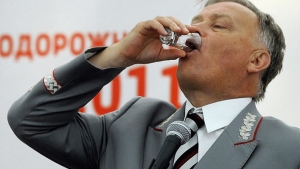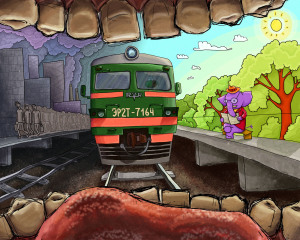
In recent years, of all state monopolies, Russian Railways JSC (RZD) has apparently become the most notorious. It seems that, having inherited enormous material and technical resources from the Soviet Ministry of Railways and enjoying a monopoly in transportation, Russian Railways JSC, recognized as the world’s third largest railroad company in 2012, has become completely confused about its priorities and purpose of its existence. Rightly called the country’s “circulatory system,” railroads have traditionally been the key mode of transportation throughout Russia’s enormous territory.
In recent years, RZD and its President Vladimir Yakunin, Vladimir Putin’s close friend, who also originated from the KGB, have repeatedly been involved in different scandals, the most notorious of them being connected with the public discovering of an incredibly luxurious country residence that allegedly belonged to the country’s main railway man. Following this incident, Yakunin was dubbed “master of the fur coat storage facility”. Although initially Yakunin himself had denied all allegations, he later declared that he sold the accursed residence that had apparently not existed until then.
As the saying goes, like priest like people: it is the New Year corporate party for the RZD top management the cost of which amounted to 50 million rubles that led to a scandal about corporate parties for state-owned companies. Even Putin urged state companies to fund corporate parties out of the staff’s own pockets, and the next day, Vladimir Yakunin had to apologize for the incident and promise to follow the Russian president’s advice.
In 2012, Russia’s Federal Antimonopoly Service (FAS) fined Russian Railways more than 2 billion rubles for abuse of dominance on the market. Later, however, the court annulled FAS’s decision.
In the same 2012, the state-owned railway monopoly yet again became the object of media and public attention, when the company paid the members of its Board of Directors 2.5 billion rubles, which is 40 percent more than in 2011, while the net profit for the same period decreased by 54 percent (to 78 billion rubles). Members of the Board of Russian Railways then received a much bigger share of the net profit than the members of the Board of Gazprom: 1.8 percent vs 0.17 percent.
Even Russian Railways’ own corporate newspaper Gudok wrote about shady payment schemes used in local RZD offices, and labor violations by RZD regional branches attracted the attention of the Russian Prosecutor’s Office.
A 2014 Reuters study of tenders held by Russian Railways identified contracts worth hundreds of millions of dollars granted to companies that ostensibly bid as rivals for government contracts but turned out to be closely interrelated. Furthermore, the winner of the RZD tender for the construction of segments of the Baikal-Amur Mainline worth 43 billion rubles is connected with some shady offshore companies.
 Russian Railways’ actions in a situation with suburban commuter trains (called elektrichkas) caused yet another scandal. In early 2015, hundreds of local passenger trains were canceled in a number of Russian regions. RZD tried to shift responsibility for this decision on to regions since it turned out that they were unable to subsidize this unprofitable yet socially important means of transport. The Kremlin’s reaction to the crisis, however, was sharp — President Putin showed yet another example of his manual management by asking “What, have you all gone mad?” and ordered suburban train routes to be reinstated. The company’s actions were considered outrageous even by those regional governors, who, although usually loyal to the federal center, are concerned about growing social tensions in towns and villages that they are in charge of as governors and the population of which uses suburban commuter trains on a daily basis. Thus, Governor of the Vologda Region Oleg Kuvshinnikov declared that Russian Railways’ concept of suburban commuter traffic “contradicts the interests of regions and the population”. Governor of the Zabaikal region Konstantin Ilkovsky accused the state-owned monopoly of pocketing all the profits while leaving regional budgets to deal with losses. Governors of the Belgorod and Voronezh regions made similar statements. Thus, Aleksey Gordeyev, governor of the Voronezh region, declared that “for RZD, everything is unfortunately about making money, but I have always believed that this is a key social sector”. And the governor of the Lipetsk Region even intends to create his own railway company.
Russian Railways’ actions in a situation with suburban commuter trains (called elektrichkas) caused yet another scandal. In early 2015, hundreds of local passenger trains were canceled in a number of Russian regions. RZD tried to shift responsibility for this decision on to regions since it turned out that they were unable to subsidize this unprofitable yet socially important means of transport. The Kremlin’s reaction to the crisis, however, was sharp — President Putin showed yet another example of his manual management by asking “What, have you all gone mad?” and ordered suburban train routes to be reinstated. The company’s actions were considered outrageous even by those regional governors, who, although usually loyal to the federal center, are concerned about growing social tensions in towns and villages that they are in charge of as governors and the population of which uses suburban commuter trains on a daily basis. Thus, Governor of the Vologda Region Oleg Kuvshinnikov declared that Russian Railways’ concept of suburban commuter traffic “contradicts the interests of regions and the population”. Governor of the Zabaikal region Konstantin Ilkovsky accused the state-owned monopoly of pocketing all the profits while leaving regional budgets to deal with losses. Governors of the Belgorod and Voronezh regions made similar statements. Thus, Aleksey Gordeyev, governor of the Voronezh region, declared that “for RZD, everything is unfortunately about making money, but I have always believed that this is a key social sector”. And the governor of the Lipetsk Region even intends to create his own railway company.
Unfortunately, in KGB schools that most current Russian top officials and managers of state-owned monopolies graduated from, they only teach you how to wield rubber truncheons at citizens whereas economics basics such as the fact that state monopolies can never be effective and their profits should return to tax payers instead of being pocketed by the management somehow get overlooked.
It is becoming increasingly harder for governors to keep tensions in regions under control, especially considering a probable decrease in revenues as a result of Russia’s current economic crisis. Some governors will sooner or later have to choose between their traditional loyalty to the Kremlin and the demands of the population that feels driven into a corner. The managing of the country’s “circulatory system” is not limited to the simple “sucking out of money”(© Viktor Pelevin). Rulers who do not understand this will have to convert their “fur coat storage facilities” into bomb shelters.





